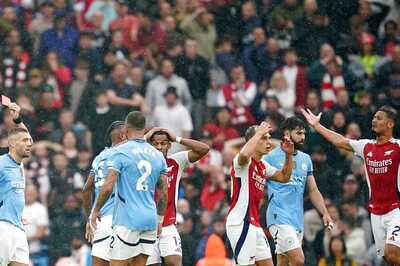
views
Mumbai: Andrew Levermore, CEO, HyperCITY - a 120,000 square feet hypermarket brand launched by the K Raheja Group in the western Mumbai suburb of Malad - is responsible for the entire gamut of operations of HyperCITY around the country.
Andrew came on board in 2004 and since then he has been involved in conceiving and crystallizing the launch of India’s largest hypermarket.
Levermore brings on broad a rich experience of close to 23 years with global giants in the retail industry both in the luxury segment and in value retail.
A South African by birth, the first half of his career was spent in operations. He then progressed to the divisional management level with the Edgars Group in South Africa and later general management level with the House of Fraser, UK.
At the House of Fraser, his stint included assignments with Dickins and Jones, Regent Street, Schofields, Leeds and Cavendish House, Cheltenham. When he moved on from the House of Fraser, Levermore was head of buying and merchandising for women’s wear.
Later, Levermore went on to become Managing Director of Guys & Girls, a fashion chain trading across five South African countries.
His next assignment was as Managing Director of The Hub, a department store chain and Sheet Street a home ware chain, both in South Africa. Prior to joining K Raheja Corp, Levermore handled the senior management responsibility of executive buying and merchandise management with Makro of South Africa.
In a freewheeling interview with moneycontrol.com, Levermore speaks his mind on Foreign Direct Investment in the Indian retail segment, the retail scenario in the country, and is so excited he believes that as a professional retailer India is the only place in the world to be in at the moment.
Q: How is it working in a booming Indian retail sector? Can you share your views about the Indian retail sector?
A: I do not think that there is anywhere in the world a time as awesome at the moment and as exciting a place to be in India from a retail perspective.
I can't think of another country where you can take a clean sheet of paper and start a prominent million-dollar retail business from scratch in a very short span of time.
In most of the other countries retail is a very formal concept and penetration of organized retail is much higher. Even in a country like China retail is considerably more organized than India.
So we (in India) really have the most dynamic opportunity of any nation on earth as far as retail goes. For me especially as a professional retailer this is the only place in the world to be at the moment.
Q: What is lacking in India; you said it is not as organized as China?
A: Well I just think that the development in China took place a lot earlier because there are lots of foreign direct investments over the decade.
China also has a very large number of domestic trade and the majority of that domestic trade, not majority but a lot of the domestic trade is bigger than India in terms of margin, and capital.
In India the only thing lacking is FDI in retail. The retail in India has a very conservative approach with regard to its expansion.
PAGE_BREAK
Q: How are your previous assignments and what are the challenges you faced?
A: I think I have been very lucky in my 23 years career in retail. I started right at the backdoor of other retail stores.
My first job as a management trainee was to unpack boxes in the receiving bay at the back of one of South African chain store companies.
The break through to retail, the best one is from operations to administration management to marketing to brand merchandising.
I really have been, very fortunate in having climbed the ladder so I am very well aware of what such a job is for young men in their receiving days, unpacking boxes.
I think that that gives me a good perspective and a great all round perspective on the retail business.
In my previous assignments I have managed a number of companies that traded across Africa.
In one particular company, we tried to expand across 7 countries in sub-Saharan Africa and that experience has helped me in India. As a lot of the infrastructure there was undeveloped like in India.
I’ve also been for four years in the United Kingdom. I have got great experience from the point of view of handling business in hat vast majority of quite surprising products or brands from all over the world be it either European brands or American brands.
So that helps in terms of business environment because obviously we didn’t always want to be an international business, a global business. Consequently we have a lot of international brand for the first time in India, which is a credit to the store (HyperCITY).
Q: How different is it working in India as compared to your previous assignments?
A: I think if one compares India to Africa there are lot of similarities; varying degrees of infrastructure are the similarities.
The biggest difference we have in India is the population differences. This population difference in the UK is pretty high but then not as high as India.
That’s some of the differences. But otherwise the consumer is the same the world over, everybody wants great value and everybody wants to have nice things.
Q: What strategies would you be lining up to upstage competition to HyperCITY? Who are your competitors?
A: Our competitors are not necessarily the big store formats. We believe that our competition is anybody who is up, riding the retail outlet, and who is selling similar products.
We tend not to focus too much on any specific competition. As far as strategy part of your question is concerned, we are very clearly focused that we will be a one-stop international store and we will offer incredible value to our customers.
Specifically, HyperCITY will be one-stop destination stores where consumers can pretty much buy the best brands at great value under one roof.
Q: One stop destination store for all kinds of consumers? What will be the pocket size of your consumers?
A: We are deliberately targeting the high-end consumer. There is a common misconception that high end consumer is not considerate or less considerate about value. That isn't true; the high-end consumer is as much value conscious as the low-income earner.
So even though when you are targeting a specific customer you need to make very sure that your store is extremely competitive and we are.
PAGE_BREAK
Q: What value do you think can you bring in to your current assignment?
A: The weight of my experience in terms of value retailing is important. Ever since the first trade of my career in authorization I’ve gained tremendously in my other assignments. However, the most important value that I will bring to HyperCITY will be global sourcing. I think I can outsource from about just any country in the world. I was sourcing out of India for nearly 8 years before taking up this assignment. I think we have the intention of sourcing from Australia and New Zealand. In my current assignment we are sourcing from Australia and New Zealand.
Q: What is more important in marketing: strategy or tactics?
A: I think it is very important to start off with a strategy. In HyperCITY, marketing strategy will be very fairly focused on conditioning that happens to any brand. In order that it appeals to the high-income consumer, we have pitched aspirations as a strategy. The tactic that we employ within that strategy is just important. We want to present to our customer a clean array of products so they are able to make their choice.
So that’s the marketing deliberate marketing practice that we have. The second tactic that we will employ is in order to remain focused on the consumer the style of advertising is very finely done and its between a product and a price. We will never allow the price to overshadow the product and the product overshadow the price.
Q: Can you share your vision for HyperCITY with us?
A: Our objective target from now on is to be there across India. We are not necessarily starting with the metros; we are looking at the mini-metros, small cities as well. What is going to determine our presence in five years from now is really available at your plan and available at your doorstep. That I will truly expect that five years from now we have as many stores comings up in India as possible.
Q: Do you have any plans to expand out of India like international global giants?
A: One of the things, which personally for me is quite stressing, is that there is acres of newsprint constantly given to the discussion of FDI and allowing FDI in retail segment in India. I would love to be in a situation where the same acres of newsprint were being given to plans of Indian retailers expanding abroad. The reserved talent in this country is stronger and more powerful than any other country on earth at this point. What we need to be doing is we need to get out of the mindset that whatever happens in foreign countries is best. Therefore if foreign countries do it this way, we should do it the same way. That is not the case by all the means.
I would love to be talking about Indian retail companies expanding in other areas of the world. Cafe Coffee Day is important for that. CCD serves in Europe, and rest of cafeterias in India should be talking in the same manner. Obviously there is a lot of territories left to be conquered first and it’s still a mammoth opportunity before you could expend. To answer your question from a HyperCITY perspective, it’s not on our immediate future plans but it is very much part of our focus.
Q: Any time line set for that?
A: That’s really tough to say about the time line. But I will say that this plan is with me. When we feel that we have done enough in India to protect the domestic turf before diverting our company to other countries.
Q: Are Indian retailers afraid of international competition?
A: I think they aren�t afraid of any international competition and they really shouldn’t be. HyperCITY is prepared for private international competition.
There are a number of various other reasons why they shouldn’t be afraid. Number one is to open, as a business in India, is a very tough exercise.
Secondly, the availability of property is quite tough and I will always put an Indian company ahead of the foreign ones in terms of acquiring property and their ability to acquire property.
Thirdly, the aspiration quotient of the Indian consumer, in terms of aspiration and quality of products they buy is very high. Their expectations from high-end retail outlets are far higher than they are in the West.
Q: On a personal note, how are you warming up to India?
A: Professionally it is the most exotic place to be. I am here with my wife and two little boys age 7 and 9. For them this is the biggest adventure that they ever been on.
They absolutely love it over here. The large part is really different for them. Because in South Africa, they had a nice big house with a garden and a swimming pool and we now have a small apartment.
That reduces their play habits, activities. They also work a lot harder at school in India, which I am really pleased about.
My wife has made a lot of Indian friends and we really have a pretty good professional life in India. We are in a comparatively crime free society compared to South Africa. We have got a lot more. Overall that’s pretty good.



















Comments
0 comment